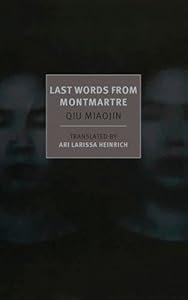
Reading Last Words from Montmartre has been a profound experience, although an epistolary novel in it's presentation, Qiu directs us at the beginning that we can read the letters in any sequence, over varying perspectives it begins to become difficult to separate the voice of the author with that of the novel's narrator, in relation to Japanese literary terms perhaps it wouldn't be far off in likening it to being in the style of a Watakushi shōsetsu. this is the impression I have after reading it. Situated in Paris the setting does switch at times, to Taipei then to Tokyo, briefly to London?, like Qiu herself the narrator is fascinated with Dazai, Mishima and other Japanese authors are referenced, Abe Kobo, Murakami Haruki as well as the films of Theodoros Angelopoulous and briefly the sculptor Paul Landowski. Initially the letters explain a break up between the narrator and Xu, her lover, the panoramic scope of vision of the narrative spins around glimpsing lives of those in proximity to the narrator, the central point of the narrative shifts, so an uncertainty remains, although fragmentary it's lucidity is piercing, it's intimacy and honesty unflinching, it's poignancy totally disarming. The novel is translated by Ari Larissa Heinrich who also gives an afterword which gives a sociological and historical background to the literary scene in Taiwan leading up to the book's first publication in 1996, the year after Qiu Miaojin's suicide in Paris.
Undoubtedly Last Words From Montmartre is a novel that will attract a great deal of discussion, I'm still reeling from reading it, and at the moment all I feel I could say about it would be in some ways to reiterate the description of it over at it's page at nyrb, so for now I'll just redirect you there and recommend the book without reservation, hopefully I'll be more articulate after reading Notes of A Crocodile, which was awarded a posthumous China Times Honorary Prize for Literature in 1995, and is also forthcoming from nyrb in a translation by Bonnie Huie, an excerpt and introduction of which is available via Kyoto Journal, but no doubt Last Words of Montmartre will be re-read before that time. Finishing his afterword Ari Larissa Heinrich observes that 'Perhaps no writer since Mishima has so mercilessly ripped the mask off the writer's true self.', it's really difficult to disagree, a landmark and monumental book.
Last Words from Montmartre at nyrb
at amazon
Undoubtedly Last Words From Montmartre is a novel that will attract a great deal of discussion, I'm still reeling from reading it, and at the moment all I feel I could say about it would be in some ways to reiterate the description of it over at it's page at nyrb, so for now I'll just redirect you there and recommend the book without reservation, hopefully I'll be more articulate after reading Notes of A Crocodile, which was awarded a posthumous China Times Honorary Prize for Literature in 1995, and is also forthcoming from nyrb in a translation by Bonnie Huie, an excerpt and introduction of which is available via Kyoto Journal, but no doubt Last Words of Montmartre will be re-read before that time. Finishing his afterword Ari Larissa Heinrich observes that 'Perhaps no writer since Mishima has so mercilessly ripped the mask off the writer's true self.', it's really difficult to disagree, a landmark and monumental book.
Last Words from Montmartre at nyrb
at amazon
No comments:
Post a Comment